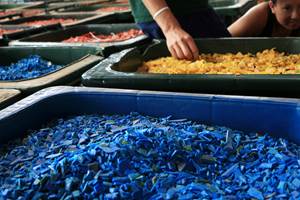Eight Startups Aim to Tackle Plastic Pollution
Rethinking Materials summit includes startups approaching issue through bioplastics and others through circular technologies.
The Rethinking Materials summit, a new virtual event from the U.K.’s Rethink Events, scheduled for May 19 and 20, will feature eight startup companies that will showcase breakthrough technologies to combat plastic pollution and waste, through innovation in raw materials and end-of-life reuse and recycling. Many more game-changing early and mid-stage companies are expected to participate in this event, which will bring together brands and retailers, plastics producers, converters, manufacturers, technology providers, regulators, startups and investors for two days of high impact online networking and knowledge exchange.
This is the first materials-related summit by the company. However, Rethink Events has produced thought leadership summits around the world for over 10 years. Included are the Future Food-Tech Series in London, New York, San Francisco and Singapore; the World Agri-Tech Innovation Summit Series in London, Amsterdam, New York, San Francisco, São Paulo and Singapore; and the World Waste to Energy & Resources Summit in London.

Sustainable, reliable and scalable: the eight start-ups of the new event are all committed to transforming the supply chain, yet each offers their unique approach to achieve this. Four are pursuing biobased solutions and four are pursuing circular solutions.
Biobased Solutions:
▪ Algaeing by Algalife (Israel) explores a holistic and sustainable development of new materials which positively affect both the environment and the human skin. “We develop innovative natural and healthy pigments and fibers, from the same microorganisms – the algae,” shares co-founder and CEO Renana Krebs.
▪ Carbonauten (Germany) has developed a system that immediately and effectively reduces CO2 emissions and costs for companies and municipalities. “We are developing decentralized sites around the world in the immediate vicinity of biomass residues, waste materials or energy consumers,” describes co-founder and CEO Christina Granacher.
▪ Gelatex Technologies’ (Estonia) patent-pending technology can reduce costs by over 90% and bring the use of biobased nanofibers to mass-scale in various applications. “Gelatex makes using biobased nanofibers possible in applications where it was not worth it before because of slow production and high prices, such as cultured meat or filtration,” explains co-founder and COO Mari-Ann Meigo.
▪ Xampla (UK) is leading the charge in plant-protein materials, a next generation material that is 100% a natural replacement for plastic. “Our next-generation material performs like synthetic polymers, but decomposes naturally and fully, without harming the environment,” details CEO Simon Hombersley.
▪ Empower (Norway) uses digitization, cloud-data and blockchain technology to store and facilitate seamless sharing of information about plastic waste and map waste flows to ensure that the plastic ends up where it has the highest value and the lowest cost to society. “Our mission is to ensure that all materials have a value and can be tracked from production to new resources, and back into new sustainable products again, with a vision to close the tap on plastic waste and recreate a world without waste, a truly circular economy,” shares founder and CEP Wilhelm Myrer.

▪ Genecis Bioindustries (Canada) is a bio-cleantech company that reprograms bacteria to make premium materials from low-value organic waste. The company’s first product line is based on high-quality biodegradable polymers that can be used to make thermo-resistant packaging, compostable coffee pods and 3D printing filaments. “By developing a technology platform that uses organic waste as the feedstock, Genecis is able to dramatically reduce the cost of producing these plastics while eliminating the use of fossil fuels in plastics production,” details COO Abdul Khogali.
▪ Magnomer (USA) has developed magnetizable inks for enhanced recycling. “Our inks can be seamlessly integrated into current packaging, improving separation in existing recycling operations,” shares founder and CEO Ravish Majithia.

▪ Scindo (UK) is a cleantech startup harnessing the power of enzymes to recycle the unrecyclables.“We believe that finding novel ways to break down plastic polymers into useful molecular components has the potential to make plastic waste one of the cheapest feedstocks available, and one of the most impactful in terms of circularity and carbon recycling,”explains co-founder and CEO Gustaf Hemberg.
Related Content
Best Practices for Purging PHA and PHA/PLA Blends
Because bioplastics are processed at lower temperatures, purging between jobs requires a different process and purging agents than those applied for traditional resins.
Read MoreAt NPE2024, Follow These Megatrends in Materials and Additives
Offerings range from recycled, biobased, biodegradable and monomaterial structures that enhance recyclability to additives that are more efficient, sustainable and safer to use.
Read MoreHow to Optimize Injection Molding of PHA and PHA/PLA Blends
Here are processing guidelines aimed at both getting the PHA resin into the process without degrading it, and reducing residence time at melt temperatures.
Read MoreAvantium and U.S.’s Origin Materials Aim to Accelerate Production of FDCA and PEF
The partnership aims to bring together both companies’ technology platforms to produce FDCA from sustainable wood residues on an industrial scale.
Read MoreRead Next
For PLASTICS' CEO Seaholm, NPE to Shine Light on Sustainability Successes
With advocacy, communication and sustainability as three main pillars, Seaholm leads a trade association to NPE that ‘is more active today than we have ever been.’
Read MorePeople 4.0 – How to Get Buy-In from Your Staff for Industry 4.0 Systems
Implementing a production monitoring system as the foundation of a ‘smart factory’ is about integrating people with new technology as much as it is about integrating machines and computers. Here are tips from a company that has gone through the process.
Read More
























